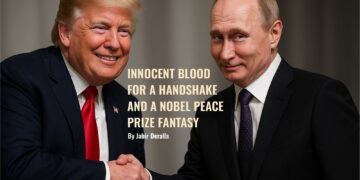One of the most insidious aspects of Russian propaganda is that it is not confined to anonymous troll farms, state television, or fringe extremist groups. In countries such as North Macedonia and across the Western Balkans — with Serbia acting as a Russian proxy in the region — respected intellectuals, opinion makers, and university professors have also become amplifiers of pro-Russian narratives. Cloaked in the language of “realism” or “peace advocacy,” these narratives legitimize aggression, erase Ukraine’s agency, and undermine European security.
This article highlights – and systematically debunks – nine of the most common false narratives currently promoted by intellectuals in the Balkans.
False Narrative 1: “Recognizing Russia as a great power is a step toward peace.”
Claim: Russia has been humiliated since the fall of the Soviet Union, and only recognition as a global power will bring stability.
Fact: This reframes Russia’s imperial aggression as “hurt pride.” In reality, Russia was not humiliated by the West — it was offered integration through institutions like the G8, trade, and partnerships. Its isolation today is self-inflicted, the result of repeated violations of international law. Recognition without accountability rewards aggression, not peace.
False Narrative 2: “NATO expansion is equivalent to the Cuban Missile Crisis.”
Claim: Just as the U.S. would not tolerate Chinese missiles in Mexico, Russia has a right to oppose NATO enlargement in Eastern Europe.
Fact: This is textbook whataboutism. NATO membership is a sovereign choice by independent states, not a foreign imposition. Unlike Cuba in 1962, Poland, the Baltic States, or North Macedonia voluntarily applied for NATO protection because of the Russian threat. Equating free alliances with hostile missile deployments distorts reality and whitewashes aggression.
False Narrative 3: “Trump is the only leader capable of bringing peace.”
Claim: Unlike Europe’s “arrogant” leaders, Trump and Putin are realists who understand that diplomacy requires compromise.
Fact: This myth portrays authoritarian leaders as pragmatic peacemakers while painting Europe as warmongering. Peace is not achieved by validating territorial conquest and war crimes. By presenting Trump and Putin as the only adults in the room, this narrative undermines democratic leaders who insist on justice, sovereignty, and international law.
False Narrative 4: “Ukraine must accept Russia’s conditions for peace.”
Claim: For peace, Ukraine must recognize Russia’s annexations, adopt neutrality, and disarm — otherwise the war will end only with Russia’s military victory.
Fact: This is the Kremlin’s script, not neutral analysis. It normalizes the idea that Ukraine’s sovereignty can be erased and its security dictated by Moscow. No international law, UN principle, or democratic value supports such conditions. Acceptance would only encourage further aggression, in Ukraine and beyond.
False Narrative 5: “The strong do what they can, the weak suffer what they must.”
Claim: Quoting Thucydides, intellectuals argue that power politics is inevitable, and Ukraine’s fate is sealed by the dominance of great powers.
Fact: This cynicism presents naked force as the only logic of international relations, dismissing human rights, international law, and collective security as illusions. It ignores the principles of the UN Charter and the EU: even small states have sovereignty and rights. Accepting this worldview endorses the same logic that led to wars, genocide, and imperial domination in the 20th century.
False Narrative 6: “Zelensky is not a legitimate leader.”
Claim: Ukraine’s president Volodymyr Zelensky lacks legitimacy due to martial law, delayed elections, or alleged manipulation.
Fact: Zelensky was elected in 2019 with a landslide democratic mandate (73% of the vote). His legitimacy is not in question — what is in question is Russia’s ongoing aggression, which makes elections impossible while missiles rain down on Ukrainian cities. Using war conditions caused by Russia to delegitimize Ukraine’s democracy is a circular propaganda trick.
False Narrative 7: “Ukraine’s government is hopelessly corrupt.”
Claim: Ukraine is so corrupt that supporting it is a waste of resources; Russia is only exploiting Ukraine’s weakness.
Fact: Corruption exists in Ukraine, as in many post-Soviet states, but it is also why Ukrainians turned away from Moscow — from the Orange Revolution to Maidan. Ukraine is undertaking painful reforms in the middle of war. Framing corruption as justification for invasion ignores that Russia’s system is structurally corrupt and oligarchic, with wealth concentrated in the Kremlin’s inner circle.
False Narrative 8: “Ukraine is a threat to Russia.”
Claim: Ukraine’s military alignment and nationalism pose an existential threat to Russia, justifying Moscow’s actions.
Fact: A country of 40 million defending its independence does not threaten a nuclear power of 140 million with the world’s largest territory. The only “threat” Ukraine poses is symbolic: the existence of a free, democratic, European-oriented Ukraine undermines Putin’s authoritarian narrative at home. The Kremlin fears democracy, not Ukraine’s tanks.
False Narrative 9: “Russia is defending itself from NATO.”
Claim: NATO’s expansion to Russia’s borders forced Moscow to act; the invasion of Ukraine is defensive.
Fact: NATO is a defensive alliance with no record of invading Russia. Enlargement has always been voluntary, driven by the fear of Russian aggression. If Russia were truly threatened by NATO, it would not have invaded non-NATO countries (Georgia 2008, Ukraine 2014 and 2022). This inversion — portraying the aggressor as the victim — is at the core of Russian propaganda.
Conclusion
By dressing these narratives in the language of academic analysis or historical analogy, certain intellectuals and professors in the Balkans give Russian propaganda a dangerous veneer of legitimacy. Whether through appeals to “realism,” false historical comparisons, or recycled myths about Ukraine’s corruption and NATO’s supposed aggression, they reinforce Moscow’s central message: that Ukraine’s sovereignty is negotiable.
But the truth is clear:
- Zelensky is a legitimate, democratically elected leader.
- Ukraine is fighting corruption even under bombardment, while Russia institutionalizes it.
- Ukraine threatens Russia only by existing as a free democracy.
- Russia is not defending itself — it is waging a war of conquest.
The influence of academics extends beyond classrooms and newspaper columns: it shapes public opinion, softens resistance to Russian aggression, and corrodes the foundations of European security. Debunking these narratives is not just about setting the record straight. It is about exposing the role of elites who lend their credibility to authoritarian powers, and reminding audiences — both local and international — that appeasement is not realism. It is complicity.
This analysis was prepared by Jabir Deralla, in cooperation with the CIVIL Hybrid Threats Monitoring Team (CHTM), as part of the organization’s ongoing monitoring of disinformation and malign foreign influence in North Macedonia and the Western Balkans.
















